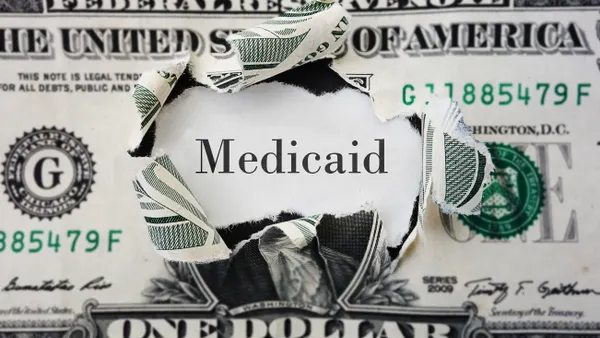Dive Brief:
- Optum Rx has hiked the minimum that independent pharmacies are reimbursed for brand name drugs as the major pharmacy benefit manager continues to work to improve its relationship with pharmacies.
- The PBM, which is owned by UnitedHealth and one of the “Big Three” drug middlemen in the U.S., announced Tuesday that it increased reimbursement minimums on brand name drugs for roughly 2,300 independent pharmacies effective Sept. 1.
- The move aligns with Optum Rx’s pivot to a more predictable and sustainable payment model for pharmacies that the PBM announced earlier this year.
Dive Insight:
Reimbursement floors set a minimum amount that a PBM has to pay a pharmacy for a prescription drug. The mandates are en vogue with states, many of which have passed laws to ensure PBMs are reimbursing pharmacies appropriately and to guard against practice called spread pricing, in which PBMs reimburse pharmacies less than they charge a health plan for a drug and pocket the difference.
An Optum Rx spokesperson did not provide details on how much its reimbursement floor is increasing, though they said that the move should ensure that pharmacies are paid closer to the actual cost of medications.
“Optum Rx is making this investment to support the long-term sustainability of pharmacies — especially independents that serve vulnerable communities without the scale or resources of larger entities,” the company said in its Tuesday release. “As brand drug utilization continues to grow alongside manufacturer-set prices, this positive change will help ensure that prescriptions filled by independent pharmacies are reimbursed at a positive margin.”
Pharmacies with the new floor for payments are fully unaffiliated with a pharmacy services administrative organization, chain or other entity, Optum Rx said. The PBM did not share why only 2,300 of the 24,000 independent and community pharmacies it contracts with are benefiting from the higher reimbursement minimums.
Optum Rx said the minimum payment hike builds on its switch to a cost-based reimbursement model announced earlier this year.
Optum Rx’s model, which the PBM plans to fully phase in by 2028, comes amid a larger push in the pharmacy benefits industry to cost-based pricing. Major PBMs are also attempting to improve their relationships with independent pharmacies, which largely blame PBMs for unsustainable reimbursement that has led many to close their doors.
Pharmacies are generally paid for drugs based on a variety of complex factors beyond cost, which results in them relying on higher rates for some medications to offset losses on others — a calculus that’s become more difficult as pricier branded drugs enter the market.
Under cost-based models, pharmacies are generally paid the drug’s acquisition cost, plus a defined markup and occasionally an additional dispensing fee. Optum Rx has not released specific details about how it will structure its own model, a decision that will have significant ramifications on U.S. pharmacies. Optum Rx is one of the largest PBMs in the U.S., managing $178 billion in pharmaceutical spending in 2024.
Major PBMs like Optum Rx are voluntarily changing elements of their business models amid intense regulatory and lawmaker scrutiny, including into how they strongarm independent pharmacies into unfair contracts and steer business to in-house pharmacies, harming independent operators.
Legacy PBMs also trying to recast themselves as transparent amid client uneasiness with opaque benefits models and competition from pharmacy upstarts like billionaire Mark Cuban’s Cost Plus Drugs.















